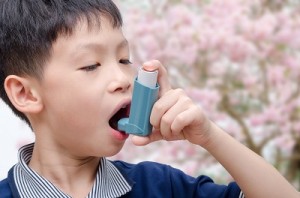Recognizing Asthma
By Dr. Hugh Black, Asthma and Allergy Specialists
 For many children and adults with asthma, winter is a tricky time. Spending more time inside means closer contact to indoor allergens like mold, pet dander and dust mites, and the cold, dry outside air offers no relief. What is asthma and what should you do about it?
For many children and adults with asthma, winter is a tricky time. Spending more time inside means closer contact to indoor allergens like mold, pet dander and dust mites, and the cold, dry outside air offers no relief. What is asthma and what should you do about it?
Asthma is a chronic respiratory disease that affects almost 9 percent of children in the United States. It is defined as recurrent episodes of airway obstruction, usually manifested by cough, wheezing or difficulty breathing, which is relieved either partially or fully by a bronchodilator (asthma medication that relaxes tightened airways).
Children with asthma can benefit greatly by using preventative treatments to keep their airways from being over reactive. Some families, however, may not recognize the symptoms of asthma or suspect the diagnosis, leaving their children to suffer from lack of treatment.
Many children present with classic asthma symptoms of audible whistles in the chest, commonly referred to as wheezes, in association with repetitive cough and difficulty breathing. This more classic form of asthma is often easily recognized, but asthma can also have more subtle symptoms. Many children only have a night-time cough, which can be dry or wet, and frequently improves during the day. This nocturnal form of asthma is more challenging to diagnose because the affected child is often clear, without cough or wheezing, when they report to their primary care provider.
Other patients may present only with shortness of breath during exercise, but not have associated tell-tale wheezing. It can be difficult to distinguish between a child who needs better athletic conditioning and a child who has shortness of breath due to tightening of the airways. There are tests to help with this diagnosis.
Asthma should be highly suspected if a prolonged cough is associated with one of the common triggers for asthmatic episodes: weather changes, outdoor activity in cold air, seasonal pollen allergy and exercise.
For any child with a chronic cough, even if it is mainly triggered by viral illness, the diagnosis of asthma should be considered. A careful evaluation by a primary care physician may lead to a lung function test or a trial of inhaled asthma medication that can provide relief and secure the diagnosis. However, unless a parent first suspects asthma and seeks medical attention, many children may go undiagnosed and not reach their full respiratory potential.
Hugh Black, MD, is a board-certified Pediatric Pulmonologist who has been practicing Pediatric Pulmonary and Allergy Medicine in Charlotte for almost 20 years. He practices with Asthma and Allergy Specialists, PA, and is the co-director of both Sleepwell Kids Pediatric Sleep Center and the Western Carolinas Affiliate Cystic Fibrosis Center.
This blog was produced in partnership with Charlotte Parent. Click here for the original post and other parenting resources.













